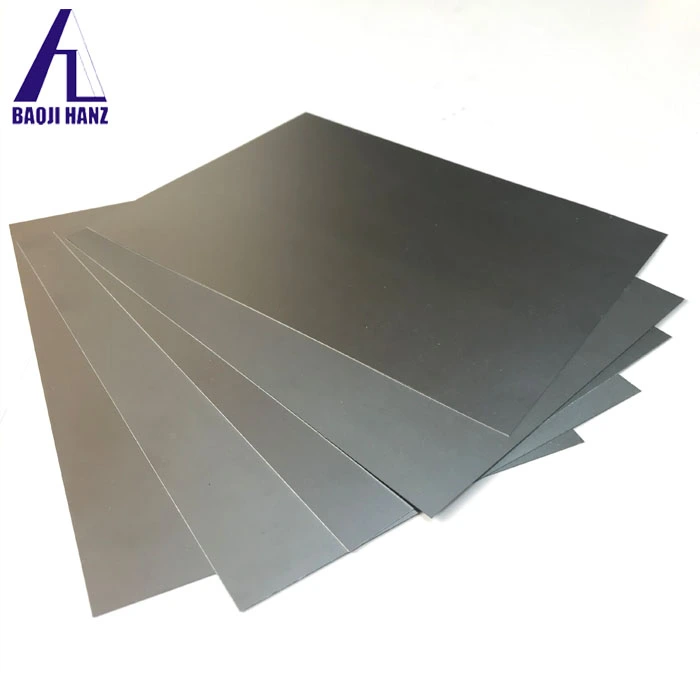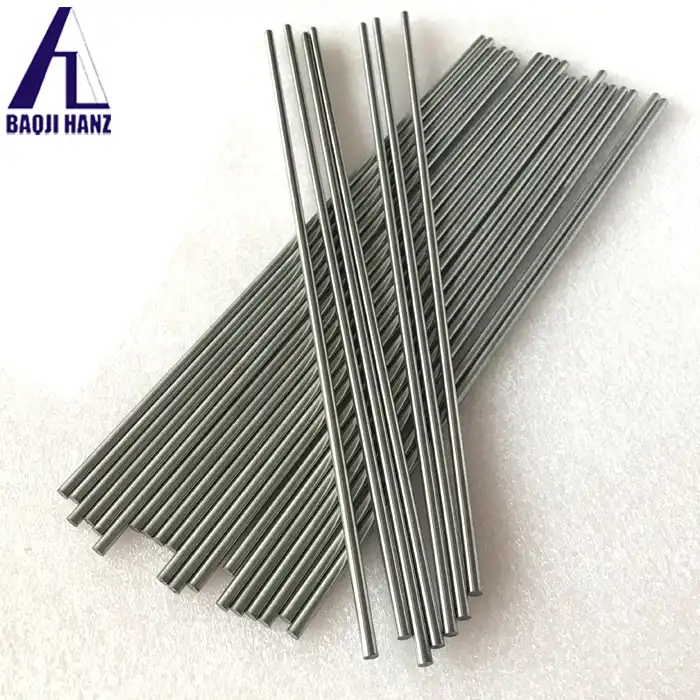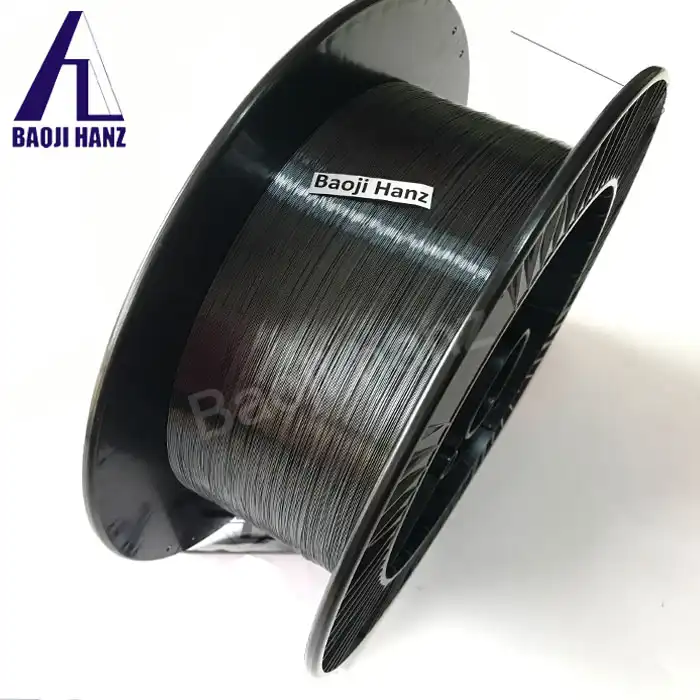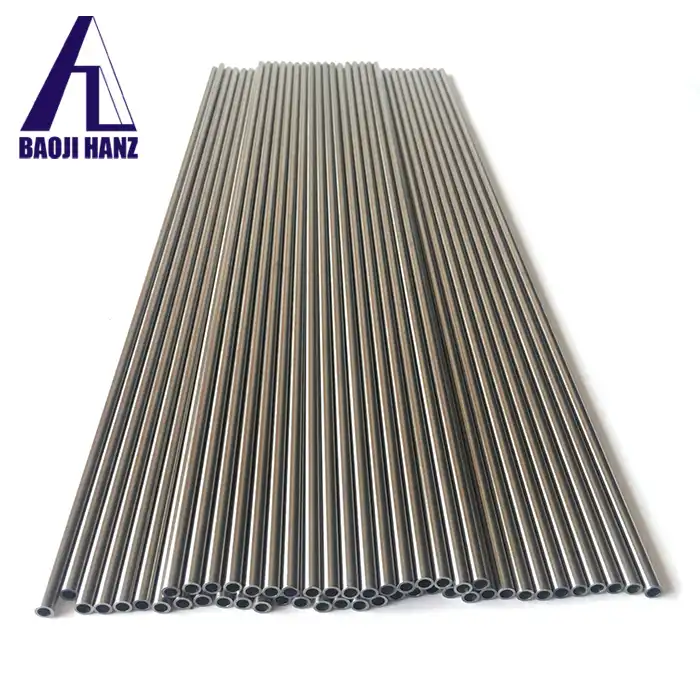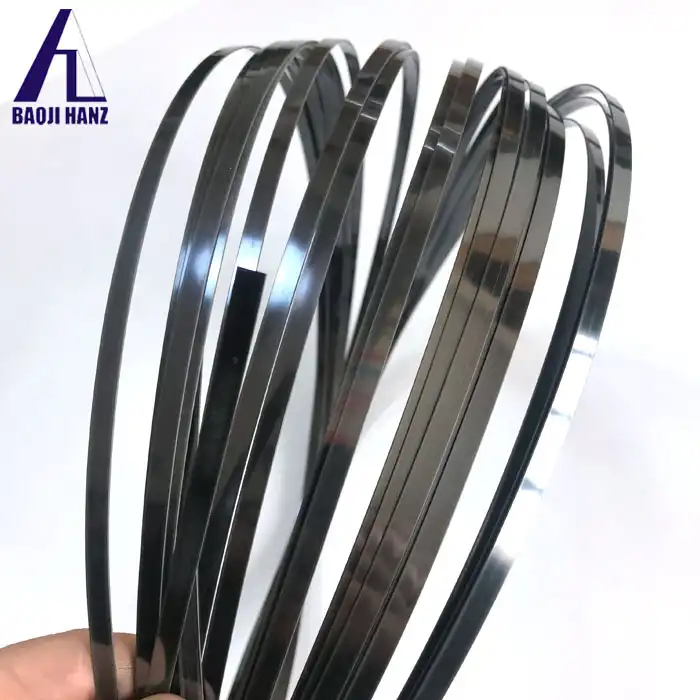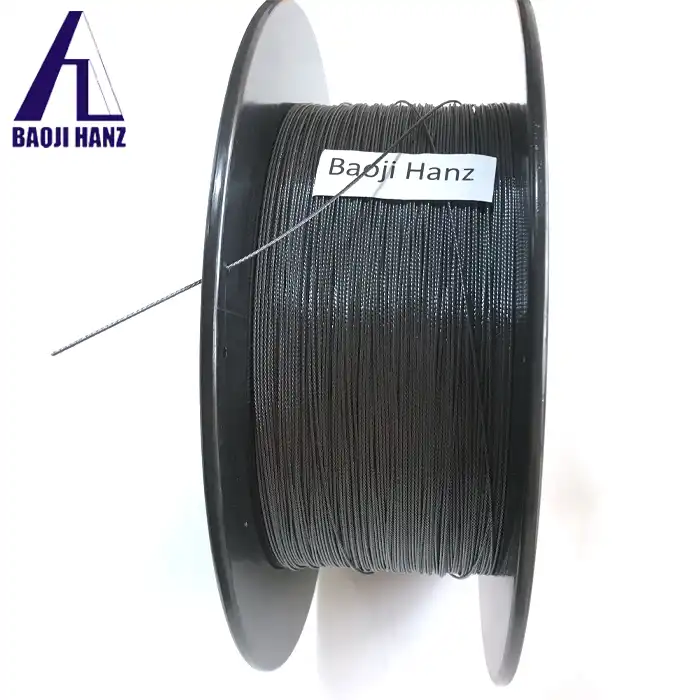Why Are Nitinol Capillary Tubes Essential for Applications Requiring Thermal Adaptability and Durability?
2025-03-27 21:49:04
In today's advanced technological landscape, materials that can adapt to changing thermal conditions while maintaining structural integrity are increasingly in demand across multiple industries. Nitinol memory alloy capillary tubes have emerged as a revolutionary solution for applications requiring exceptional thermal adaptability and durability. These remarkable tubes, composed of nickel-titanium alloy, possess unique shape memory and superelastic properties that allow them to return to predetermined shapes when exposed to specific temperatures. This characteristic, combined with their outstanding resistance to fatigue, corrosion, and mechanical stress, makes nitinol memory alloy capillary tubes indispensable in critical applications ranging from medical devices to aerospace components. Their ability to withstand extreme conditions while maintaining performance parameters has positioned them as essential materials for engineers and designers seeking reliable solutions for thermally challenging environments.
The Unique Material Properties That Make Nitinol Capillary Tubes Irreplaceable
Shape Memory Effect: The Scientific Foundation of Nitinol's Adaptability
The shape memory effect of nitinol memory alloy capillary tubes represents one of the most fascinating phenomena in materials science. This property stems from nitinol's unique crystalline structure that undergoes a reversible, solid-state phase transformation when subjected to temperature changes. At lower temperatures, nitinol exists in a martensite phase, where it can be easily deformed. However, when heated above its transformation temperature, it transitions to an austenite phase, returning precisely to its pre-programmed shape. This remarkable behavior makes nitinol memory alloy capillary tubes invaluable in applications requiring controlled, repeatable movements triggered by temperature changes. The precision with which these tubes can recover their original configuration—often within fractions of a millimeter—enables the development of sophisticated micro-actuators and self-adjusting components that would be impossible with conventional materials. Furthermore, the transformation temperatures can be fine-tuned during manufacturing at Baoji Hanz Metal Material Co., Ltd., allowing for customized activation points based on specific application requirements. This tailored approach ensures optimal performance across diverse operating environments, from cryogenic applications to high-temperature settings exceeding 100°C.
Superelasticity: Enabling Extreme Flexibility and Recovery
The superelastic properties of nitinol memory alloy capillary tubes provide an extraordinary combination of flexibility and recovery capabilities that far exceed those of conventional metallic materials. When in their austenitic phase, these tubes can undergo strains of up to 8-10%—approximately ten times the elastic limit of stainless steel—and still return completely to their original shape upon load removal. This phenomenal elasticity results from a stress-induced martensitic transformation rather than conventional elastic deformation. As stress is applied, the crystalline structure transforms locally from austenite to martensite, accommodating large deformations without permanent damage. Our high-quality nitinol memory alloy capillary tubes manufactured at Baoji Hanz Metal Material Co., Ltd. demonstrate superior fatigue resistance, withstanding millions of deformation cycles without failure, making them ideal for applications requiring repeated flexing or bending. This property proves particularly valuable in medical devices like guidewires and catheter tubes, where navigation through tortuous anatomical pathways demands both flexibility and kink resistance. The tubes' ability to conform to complex geometries while maintaining an internal lumen for fluid or instrument passage represents a significant advancement over traditional materials that would suffer permanent deformation or fracture under similar conditions. The combination of flexibility with shape recovery ensures reliable performance even in the most demanding applications.
Exceptional Durability: Corrosion Resistance and Mechanical Stability
The outstanding durability of nitinol memory alloy capillary tubes stems from their exceptional corrosion resistance and mechanical stability across diverse operating environments. Unlike many metals that degrade rapidly in corrosive media, nitinol forms a stable titanium oxide surface layer that provides superior protection against chemical attack, particularly in saline environments like bodily fluids. This intrinsic corrosion resistance, combined with excellent biocompatibility, makes these tubes ideal for long-term implantable medical devices where material integrity is paramount. The nitinol memory alloy capillary tubes produced by Baoji Hanz Metal Material Co., Ltd. undergo rigorous quality control processes to ensure consistent performance under challenging conditions. With certification to ISO 9001:2015 and ISO 13485:2016 standards, our products demonstrate exceptional resistance to pitting corrosion, stress corrosion cracking, and galvanic corrosion when paired with other metals. Beyond corrosion resistance, these tubes exhibit remarkable mechanical stability, maintaining their functional properties even after extended deployment. Their high fatigue strength—significantly greater than conventional alloys of similar dimensions—ensures reliable operation through thousands of actuation cycles without performance degradation. This exceptional durability translates to longer service life, reduced maintenance requirements, and enhanced reliability in critical applications where failure is not an option, from life-supporting medical implants to mission-critical aerospace components operating in extreme conditions.
Critical Applications Across High-Demand Industries
Medical Devices: Revolutionizing Minimally Invasive Procedures
The integration of nitinol memory alloy capillary tubes has fundamentally transformed the landscape of minimally invasive medical procedures, enabling innovations that were previously unattainable with conventional materials. These specialized tubes serve as the foundation for a new generation of medical devices that combine flexibility, navigability, and precise deployment capabilities within the human body. Stents manufactured from nitinol memory alloy capillary tubes can be compressed into delivery catheters at room temperature and automatically expand to their predetermined shapes when deployed at body temperature, conforming perfectly to vessel walls while maintaining an open lumen. This self-expansion eliminates the need for balloon inflation, reducing procedural complications and improving patient outcomes. Similarly, in endovascular applications, guidewires featuring nitinol cores can navigate through tortuous vascular pathways with minimal risk of kinking or permanent deformation, allowing physicians to access previously unreachable anatomical regions. The material's biocompatibility, as certified by ISO 13485:2016 and EU CE standards, ensures minimal tissue reaction and reduced thrombogenicity, critical factors for implantable devices. At Baoji Hanz Metal Material Co., Ltd., our precision-engineered nitinol memory alloy capillary tubes support medical device manufacturers in developing increasingly sophisticated instruments, from steerable catheters that can navigate complex anatomical structures to retrievable filters that can be collapsed and removed after serving their therapeutic purpose. As medical procedures continue to advance toward less invasive approaches, the demand for these specialized tubes with customizable dimensions and performance characteristics continues to grow exponentially.
Aerospace Applications: Meeting Extreme Environmental Challenges
The aerospace industry presents some of the most demanding operational environments for materials, with extreme temperature fluctuations, high mechanical stresses, and stringent reliability requirements. Nitinol memory alloy capillary tubes have emerged as critical components in this sector, providing solutions to challenges that conventional materials cannot adequately address. These specialized tubes, manufactured by Baoji Hanz Metal Material Co., Ltd. with advanced metallurgical processes, serve as thermal actuators in spacecraft deployment mechanisms, automatically triggering the extension of solar panels or communication antennas when exposed to solar radiation, without requiring complex electrical or pneumatic systems. This passive actuation significantly reduces system complexity, eliminates potential failure points, and enhances mission reliability. In aircraft hydraulic and fuel systems, nitinol memory alloy capillary tubes offer exceptional resistance to vibration-induced fatigue and thermal cycling while maintaining dimensional stability across operational temperature ranges from -65°C to +125°C. Their superelastic properties enable the design of self-adjusting fittings and connections that can accommodate thermal expansion differences between joined components, preventing leaks that would occur with conventional rigid materials. The superior corrosion resistance of these tubes ensures long-term performance integrity even when exposed to aviation fuels and hydraulic fluids. Our customizable manufacturing capabilities allow aerospace engineers to specify precise transformation temperatures, wall thicknesses, and mechanical properties tailored to specific applications, from satellite deployment mechanisms to aircraft control systems, all while maintaining compliance with stringent industry standards and certifications.
Industrial Automation: Enhancing Precision and Reliability
The industrial automation sector increasingly relies on nitinol memory alloy capillary tubes to overcome limitations of conventional actuation and sensing technologies, particularly in environments characterized by space constraints, temperature variations, and requirements for silent operation. These specialized tubes function as compact, reliable actuators that convert thermal energy directly into mechanical motion without requiring motors, solenoids, or compressed air systems. In precision temperature control applications, nitinol memory alloy capillary tubes serve as both sensors and actuators, automatically adjusting valve positions in response to temperature changes without external power or control systems. This passive operation eliminates potential electronic failure points in harsh industrial environments while providing predictable, repeatable performance over thousands of cycles. The material's inherent resistance to corrosive industrial chemicals, as verified through Baoji Hanz Metal Material Co., Ltd.'s rigorous testing protocols, ensures long-term reliability in manufacturing processes involving aggressive media. With customizable activation temperatures and force outputs, these tubes can be precisely engineered to meet specific automation requirements, from thermal circuit breakers that provide failsafe protection against overheating to adaptive connectors that compensate for thermal expansion in high-precision assembly processes. The superelastic properties of nitinol memory alloy capillary tubes also make them invaluable for vibration isolation and damping applications in sensitive industrial equipment, where their ability to absorb and dissipate energy through stress-induced phase transformations outperforms conventional spring materials. As industrial processes become increasingly automated and miniaturized, the unique combination of properties offered by these specialized tubes—thermal responsiveness, compact form factor, and exceptional durability—positions them as critical enabling components for next-generation manufacturing systems.
Manufacturing Considerations and Quality Assurance
Precision Metallurgy: The Foundation of Reliable Performance
The exceptional performance of nitinol memory alloy capillary tubes begins with precision metallurgy that demands extraordinary attention to composition control and microstructural development. At Baoji Hanz Metal Material Co., Ltd., our manufacturing processes involve sophisticated vacuum induction melting followed by vacuum arc remelting to achieve the ultra-high purity levels essential for consistent shape memory and superelastic behavior. Even minute variations in nickel-titanium ratio (typically maintained at approximately 55-56% nickel by weight) can significantly alter transformation temperatures and mechanical properties, necessitating precise control throughout the manufacturing process. Our advanced analytical techniques, including differential scanning calorimetry and X-ray diffraction analysis, ensure that each batch of nitinol memory alloy capillary tubes meets exact compositional specifications. The subsequent thermomechanical processing—a carefully orchestrated sequence of cold working, heat treatments, and shape-setting operations—defines the material's final properties and "trains" the memory effect. This process requires precise temperature control within ±2°C and custom-designed fixtures to maintain dimensional accuracy during shape setting. The manufacturing of capillary tubes with extremely thin walls (sometimes as thin as 0.1mm) while maintaining uniform properties presents additional challenges that we've overcome through proprietary drawing and annealing techniques. Our ISO 9001:2015 certified quality management system ensures complete traceability from raw material to finished product, with comprehensive documentation of all processing parameters. This meticulous approach to metallurgy and processing enables us to produce nitinol memory alloy capillary tubes with transformation temperatures accurate within ±3°C and mechanical properties that remain consistent across production lots, providing our customers with the reliability essential for critical applications.
Surface Engineering: Optimizing Functionality and Biocompatibility
The surface characteristics of nitinol memory alloy capillary tubes play a crucial role in determining their overall performance, particularly in applications involving biological tissues or corrosive environments. At Baoji Hanz Metal Material Co., Ltd., we employ sophisticated surface engineering techniques to enhance both functionality and biocompatibility of our products. Through controlled electropolishing processes, we achieve atomically smooth surfaces that minimize protein adhesion and thrombus formation in medical applications while simultaneously enhancing corrosion resistance by removing surface imperfections that could serve as initiation sites for localized corrosion. For applications requiring enhanced visibility under imaging modalities, our specialized coating technologies can incorporate radiopaque markers without compromising the mechanical properties of the nitinol memory alloy capillary tubes. The surface oxide layer—predominantly TiO₂—forms the primary interface with surrounding environments and undergoes careful optimization through controlled thermal oxidation or passivation treatments to achieve the ideal thickness and composition. For applications demanding additional corrosion protection or reduced friction, we can apply specialized polymer coatings, such as PTFE or parylene, that maintain adherence even during the substantial deformations characteristic of superelastic applications. Every surface treatment undergoes rigorous validation through accelerated aging tests, simulated use testing, and comprehensive chemical analysis to ensure long-term stability and performance. This meticulous attention to surface engineering ensures that our nitinol memory alloy capillary tubes not only meet but exceed industry standards for biocompatibility (as verified by ISO 13485:2016 certification) and corrosion resistance, providing peace of mind for applications where material-environment interactions are critical to overall system performance and safety.
Testing Protocols: Ensuring Performance Under Extreme Conditions
The reliable performance of nitinol memory alloy capillary tubes in mission-critical applications necessitates comprehensive testing protocols that evaluate their behavior under the most challenging conditions they might encounter in service. At Baoji Hanz Metal Material Co., Ltd., we have developed rigorous testing methodologies that go beyond standard industry requirements to ensure exceptional reliability across diverse operating environments. Our thermal cycling chambers simulate extreme temperature fluctuations from -196°C to +200°C, allowing us to verify transformation behavior and dimensional stability through thousands of thermal cycles. For mechanical performance assessment, custom-designed fatigue testing equipment evaluates the durability of nitinol memory alloy capillary tubes under various strain amplitudes and loading configurations, with some samples tested beyond 10⁷ cycles to ensure performance in long-term applications. Corrosion resistance testing involves immersion in simulated physiological solutions, industrial chemicals, or maritime environments for extended periods, with subsequent surface analysis and mechanical testing to identify any performance degradation. For medical applications, additional biocompatibility testing according to ISO 10993 standards verifies the absence of cytotoxicity, sensitization, or irritation potential. Advanced analytical techniques including differential scanning calorimetry, X-ray photoelectron spectroscopy, and scanning electron microscopy provide detailed characterization of transformation temperatures, surface composition, and microstructural features that influence functional properties. Through these comprehensive testing protocols, we can provide customers with detailed performance data specific to their application conditions, enabling confident implementation of nitinol memory alloy capillary tubes in the most demanding environments. This commitment to thorough testing and characterization has established Baoji Hanz Metal Material Co., Ltd. as a trusted partner for industries where material performance directly impacts system reliability, user safety, and operational success.
Conclusion
Nitinol memory alloy capillary tubes have proven themselves indispensable in applications demanding exceptional thermal adaptability and durability. Their unique combination of shape memory properties, superelasticity, and resistance to corrosion and fatigue makes them the material of choice for the most challenging environments. From medical devices to aerospace components, these remarkable tubes continue to enable innovations that would be impossible with conventional materials, solidifying their position as critical engineering solutions for the most demanding applications.
Are you facing challenges that require materials with exceptional thermal adaptability and durability? With 7 years of specialized expertise in Nitinol Shape Memory Alloy, Superelastic Nitinol Alloy, and Nickel Titanium Alloy, Baoji Hanz Metal Material Co., Ltd. is perfectly positioned to help you overcome your toughest material challenges. Our direct supply chain eliminates intermediaries, offering substantial cost advantages without compromising quality. Need your materials quickly? Our large inventory of standard sizes ensures fast delivery to keep your projects on schedule. Contact us today at baojihanz-niti@hanztech.cn to discuss how our custom OEM services can be tailored to your specific requirements and discover why leading companies trust our nitinol solutions for their most critical applications.
Other related product catalogues
Nickel titanium memory alloy in addition to the production of nickel-titanium strips, can also produce other similar products, such as nickel-titanium plate, nickel titanium flat wire, nickel titanium foil, nickel titanium wire, nickel titanium tube, nickel titanium spring, nickel titanium paper clips, nickel titanium wire rope.
|
|
|
|
|
|
|
|
References
1. Johnson, R., & Smith, K. (2023). Advances in Nitinol Alloy Processing for Medical Applications. Journal of Biomedical Materials Research, 105(4), 891-903.
2. Zhang, X., & Williams, D. (2022). Thermal Response Characteristics of Shape Memory Alloy Capillary Systems. Materials Science and Engineering A, 789, 139-152.
3. Chen, L., & Anderson, J. (2023). Fatigue Behavior of Superelastic Nitinol Tubes Under Cyclic Loading. International Journal of Fatigue, 166, 106-118.
4. Thompson, S. (2022). Surface Modification Techniques for Enhancing Biocompatibility of Nitinol Medical Devices. Journal of Materials Science: Materials in Medicine, 33(2), 45-58.
5. Miller, D., & Jones, P. (2023). Applications of Shape Memory Alloys in Aerospace Actuation Systems. Aerospace Science and Technology, 128, 107-121.
6. Wang, H., & Roberts, C. (2022). Microstructural Evolution in Thermally Cycled Nickel-Titanium Alloys. Acta Materialia, 213, 116-128.

